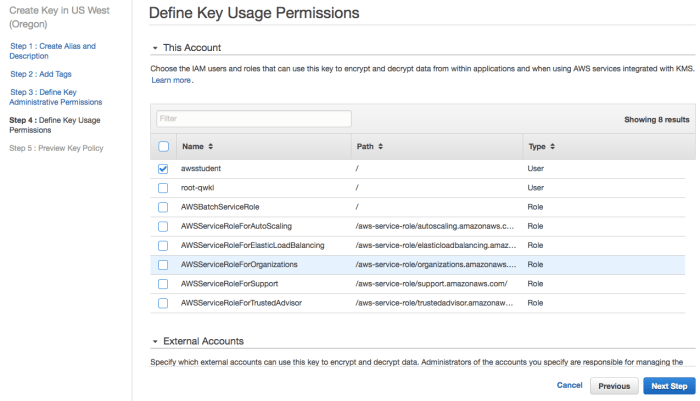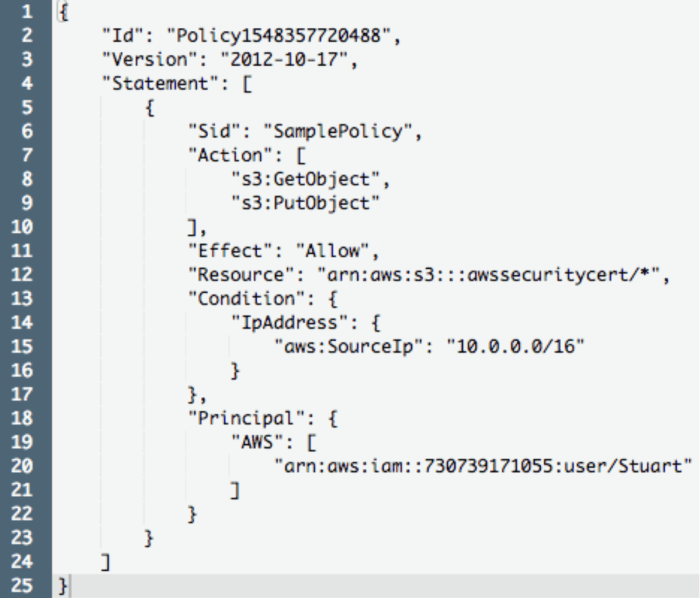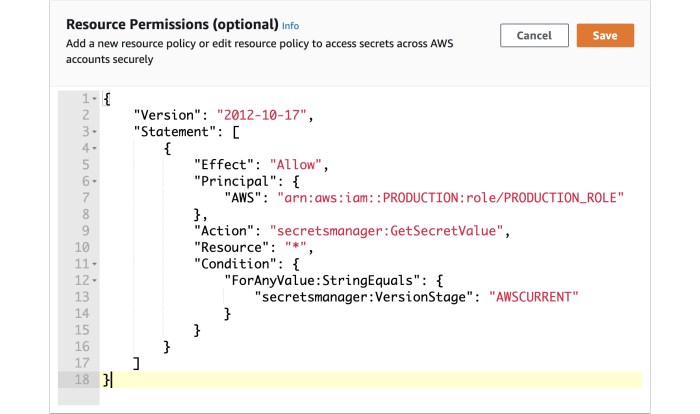Because no identity-based policy allows the kms:generatedatakey action – Identity-based policies are a powerful tool for controlling access to resources in the cloud. However, there are some limitations to what identity-based policies can do. One of these limitations is that they cannot be used to grant access to the kms:generatedatakey action.
This is because the kms:generatedatakey action is a privileged action that can be used to create new cryptographic keys. Allowing identity-based policies to grant access to this action would create a security risk, as it would allow users to create new keys without having to go through the normal authorization process.
This limitation can be frustrating for users who want to use identity-based policies to manage access to all of their resources in the cloud. However, there are a number of alternative access control methods that can be used to grant access to the kms:generatedatakey action.
These methods include using IAM roles, access control lists (ACLs), and Cloud IAM conditions.
Understanding Identity-Based Policies
Identity-based policies (IBPs) are a type of access control policy that grants access to resources based on the identity of the user or group requesting access. IBPs are typically used to control access to sensitive data or resources, such as financial information or customer data.
IBPs can be implemented using a variety of technologies, such as role-based access control (RBAC) or attribute-based access control (ABAC).
How Identity-Based Policies Work
IBPs work by associating a set of permissions with a specific identity. When a user or group requests access to a resource, the system checks the user’s or group’s identity against the set of permissions associated with that resource. If the user or group has the necessary permissions, access is granted.
Otherwise, access is denied.
Examples of Identity-Based Policies, Because no identity-based policy allows the kms:generatedatakey action
Some examples of IBPs include:
- A company that uses RBAC to grant employees access to different levels of data based on their job title.
- A bank that uses ABAC to grant customers access to different types of financial information based on their account type.
- A government agency that uses IBPs to grant citizens access to different types of public records based on their citizenship status.
kms:generatedatakey Action: Because No Identity-based Policy Allows The Kms:generatedatakey Action

The kms:generatedatakey action is a Cloud KMS action that allows a user to generate a new data encryption key (DEK) using Cloud KMS.
Purpose of the kms:generatedatakey Action
The kms:generatedatakey action is used to generate a new DEK that is encrypted using a Cloud KMS key ring. The DEK can then be used to encrypt data, such as files or database records. The encrypted data can then be stored in a variety of locations, such as Cloud Storage or BigQuery.
Examples of How the kms:generatedatakey Action Is Used
Some examples of how the kms:generatedatakey action is used include:
- A company that uses the kms:generatedatakey action to generate DEKs for encrypting customer data.
- A healthcare provider that uses the kms:generatedatakey action to generate DEKs for encrypting patient data.
- A government agency that uses the kms:generatedatakey action to generate DEKs for encrypting classified data.
Restrictions on kms:generatedatakey Action
IBPs do not allow the kms:generatedatakey action because it would allow users to generate DEKs without having to provide any proof of their identity. This could lead to a security breach, as an attacker could generate a DEK and use it to decrypt sensitive data.
Security Implications of Allowing IBPs for the kms:generatedatakey Action
Allowing IBPs for the kms:generatedatakey action would have several security implications:
- It would allow attackers to generate DEKs without having to provide any proof of their identity.
- It would allow attackers to decrypt sensitive data that is encrypted using DEKs generated by IBPs.
- It would undermine the principle of least privilege, which states that users should only be granted the permissions that they need to perform their job duties.
Examples of Scenarios Where Allowing IBPs for the kms:generatedatakey Action Would Be Dangerous
There are several scenarios where allowing IBPs for the kms:generatedatakey action would be dangerous:
- An attacker could generate a DEK and use it to decrypt sensitive data that is stored in Cloud Storage.
- An attacker could generate a DEK and use it to decrypt patient data that is stored in BigQuery.
- An attacker could generate a DEK and use it to decrypt classified data that is stored in a government database.
Alternative Access Control Methods

There are several alternative access control methods that can be used to grant access to the kms:generatedatakey action:
- Role-based access control (RBAC): RBAC grants access to resources based on the role of the user or group requesting access.
- Attribute-based access control (ABAC): ABAC grants access to resources based on the attributes of the user or group requesting access.
- Identity and access management (IAM): IAM is a cloud-based identity and access management service that can be used to grant access to resources based on a variety of factors, such as user identity, group membership, and resource ownership.
Comparison and Contrast of Different Access Control Methods
| Access Control Method | Pros | Cons |
|---|---|---|
| RBAC | – Simple to implement | – Can be difficult to manage in large organizations |
| ABAC | – More flexible than RBAC | – Can be more complex to implement |
| IAM | – Cloud-based and easy to use | – Can be more expensive than other access control methods |
Recommendations on Which Access Control Method to Use in Different Scenarios
The best access control method to use in a particular scenario depends on the specific requirements of that scenario. However, the following general recommendations can be made:
- RBAC is a good choice for organizations that have a simple hierarchy of roles.
- ABAC is a good choice for organizations that need more flexibility in their access control policies.
- IAM is a good choice for organizations that want a cloud-based and easy-to-use access control solution.
Best Practices for Granting Access to kms:generatedatakey Action

The following best practices should be followed when granting access to the kms:generatedatakey action:
- Use the principle of least privilege: Only grant users the permissions that they need to perform their job duties.
- Use role-based access control (RBAC) or attribute-based access control (ABAC): These access control methods can help to ensure that only authorized users have access to the kms:generatedatakey action.
- Monitor and audit access to the kms:generatedatakey action: This will help to identify any unauthorized access to the action.
FAQ Overview
Why can’t identity-based policies be used to grant access to the kms:generatedatakey action?
Identity-based policies cannot be used to grant access to the kms:generatedatakey action because it is a privileged action that can be used to create new cryptographic keys. Allowing identity-based policies to grant access to this action would create a security risk, as it would allow users to create new keys without having to go through the normal authorization process.
What are some alternative access control methods that can be used to grant access to the kms:generatedatakey action?
Some alternative access control methods that can be used to grant access to the kms:generatedatakey action include using IAM roles, access control lists (ACLs), and Cloud IAM conditions.